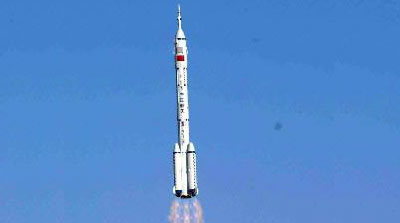China in space: The US responseby Taylor Dinerman
|
| The best American response to China’s space program is to revitalize the US one, based on an equally logical and farsighted national strategy. |
China is determined have at least some of all four aspects of spacepower: scientific, commercial, human, and military. Being practical, the Chinese want to make these different aspects of their spacepower reinforce each other. Thus, the Shenzhou capsule has a military reconnaissance capability similar to what the old USSR had on some of their manned spacecraft, and comparable to what the US had wanted to accomplish with the old Manned Orbiting Laboratory (MOL) project. Their cooperation with the European on Galileo and with the Brazilians on the CBERS series of remote sensing satellites has obvious military implications, no matter what the Europeans or Brazilians pretend.
The science they plan to do with their planned series of lunar probes will obviously help them with any commercial ambitions they may have in the future. For example, they plan to prospect for helium-3 and for other commercially valuable elements. They also plan to study solar particles and solar wind from the vantage point of lunar orbit. This will give them new technological insight into how to shield their spacecraft from dangerous forms of solar radiation.
This is a logical approach for a nation of limited resources that wants to have its place in the sun. The US is not in a position to begrudge them this ambition, but neither is it reasonable to expect America to ignore the potential challenge. China has no reason, as of now, to dispute American global power. The trade factor is too important and China lacks the technological and military power to take on the US and its East Asian allies. This situation, however, may not last forever.
As long as the US maintains a low key, but realistic, response to China’s drive for spacepower, normal cooperation between the two nations will be continued. There is no reason to expect that Beijing wants to enlist as a junior partner in France’s grandiose anti-American alliance. There is also no reason for the US to want to do any serious damage to China’s position as a rising commercial and cultural power in Asia. China’s military power, at its current rate of growth, is not going to be a threat for at least another couple of decades. A prudent approach to China’s power will take into account not only the spectacular growth of its coastal region, but also the incredible poverty of most of its rural areas. China’s problems in Sianking and Tibet cannot be ignored either.
| As long as the US maintains a low key, but realistic, response to China’s drive for spacepower, normal cooperation between the two nations will be continued. |
The US and China have a strong mutual interest in keeping North Korea from getting nuclear weapons. The fact that they slowly came around to an agreement with the Bush Administration and with Japan on a multilateral approach to Kim Jong Il’s ambitions shows that the leadership of the Chinese Communist Party is far more open to pursuing its own self interest, even when it conflicts with Marxist Leninist ideology, than the old Soviet Union ever was.
Communist China will never be a full partner of the US, but neither does it look as if it will become an implacable enemy—at least not as long as it continues its current grand strategy, which consists of a drive for commercial development and regional “soft power,” combined with enough military power to threaten Taiwan, if that island republic ever decides it wants to formally challenge the “one China” policy. Beijing’s gradual acquisition of spacepower fits into this long-term grand strategy.
Spacepower, like seapower, is not a zero-sum game. Instead, it is a complex and ever-changing set of forces that can add wealth and prosperity to a nation, while at the same time enhancing its military power. As long as China pursues a balanced space program, the US can afford to look on it with wary benevolence. If, however, the Chinese drastically change their current modest and realistic grand strategy, the US will have to find a new approach.
One factor the US will have to deal with is the Chinese response to the development and deployment of missile defenses. China’s investment in ICBMs and other long-range nuclear weapons will be devalued by any US defensive system. The Chinese will have to be quietly convinced that the US will limit its use of its advantage in this area to its own vital interests, as well as to the broad interests of the international community. This is not going to be easy, but the Chinese understand both the value and limits of strategic defenses.
In the long term, China’s search for new extraterrestrial resources is a logical response to the needs of their economy. If they want to provide a Western standard of living to their people, they will either have to compete with the West and with other emerging economies for energy and minerals on Earth, or they will have to go looking for them elsewhere. The best American response to China’s space program is to revitalize the US one, based on an equally logical and farsighted national strategy.
